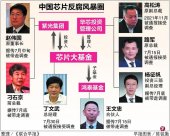
Industry insiders told the United Zard that as the US chip bill passed, relevant departments are brewing a new round of restrictions on the Chinese chip industry, which may be launched this week.
As the US Congress passed the chip bill, the official quietly tightened the restrictions on China's acquisition of chip manufacturing equipment.
Industry insiders disclosed that in the short term of the United States, it will also impose new restrictions on Chinese semiconductors and crack down on the Chinese chip industry through "combination boxing".
Bloomberg quoted people familiar with the matter on Saturday (July 30) that many American equipment manufacturers received official notice in the past two weeks and were asked not to provide China for equipment manufacturing for 14 nanometers or below chips.Essence
Semiconductor equipment manufacturers Lam Research and KLA have also confirmed last week that the US government has been notified to expand its technical export restrictions on Chinese chip factories to equipment for manufacturing 14 nanometers and below.
The process of chip manufacturing technology is usually calculated in nano -units. The smaller the number represents the more advanced technology, the smaller and higher -performance chips.
At the end of 2020, the former US President Trump administration included SMICs on the grounds of national security, and prohibit American companies from selling them to this Chinese chip giant without permission to make 10 nanometers and advanced chips.equipment.The Bayeon government expands the limitation of chip manufacturing from 10 nanometers to 14 nanometers, which means that more semiconductor equipment is limited.This restriction not only affects SMIC, but also affects the foundry chip factory operating in mainland China.
Industry insiders told Lianhe Zaobao that with the passage of the US chip bill, relevant departments are brewing a new round of restrictions on the Chinese chip industry, which may be launched this week.
Gu Wenjun, chief analyst of the semiconductor research institution, analyzed the analysis of the chief analyst at the study of the chief analyst of the semiconductor research institution that related restrictions may be expanded from production equipment to the field of installation and maintenance, such as prohibiting suppliers from providing follow -up services for equipment exported to China to increase equipment maintenanceThe difficulty of upgrading."In the future, enterprises to enhance chip production capacity, and it will be harder to engage in innovation breakthroughs."
The US Congress voted for a total of US $ 280 billion (S $ 386.6 billion) chip with the Chips and Science Act (S $ 386.6 billion) last week, and will be signed by Biden as soon as this week.According to the bill, the U.S. government will provide local chip manufacturers with $ 52 billion subsidies and $ 24 billion in tax incentives, and will allocate about 200 billion yuan to support relevant innovation, training and research and development in the next five years to enhance their ability to compete with China.
The Ministry of Commerce of China responded on the official website last Friday (July 29) that the US chip bill provided huge subsidies to the US local chip industry, which is a "typical differentiated industrial support policy."
Some terms of the bill restrict the normal economic and trade and investment activities of enterprises in China will distort the global semiconductor supply chain and disturb the international trade.
A spokesman for the Ministry of Commerce said that China will continue to pay attention to the progress and implementation of the bill, and take "powerful measures" to safeguard its rights and interests if necessary.
It will exacerbate global semiconductor competition to stimulate China to accelerate the process of domesticization
Guo Rong Securities researcher Zhang Zhigang is optimistic that the U.S. "Chip Act" will greatly exacerbate the global semiconductor industry competition, which is expected to stimulate the Chinese semiconductor industry to accelerate the domesticization process.
He pointed out that about 80 % of theil's investment and construction of wafer plant is used for equipment purchase. At present, Chinese manufacturers have made breakthroughs in the fields of etching equipment and thin film deposition equipment. It is expected to continue to benefit from the expansion of domestic wafers in the future.Increased demand and the process of equipment localization.
Gu Wenjun also believes that the chip bill is a double -edged sword, which can force China to reduce its dependence on US equipment and accelerate the localization process of the chip industry.
He said: "U.S. sanctions will definitely bring pain in the short term, and Chinese industry players need to digest for one or two years. However, after Huawei has been sanctioned, Chinese chip industry has clearly realized that the United States curbs China's advanced technology development technologyThe policy will not change for a long time. Such a bottom -line thinking will promote the industry more actively with markets outside the United States, establish contact, and accelerate their own ability and level. "




